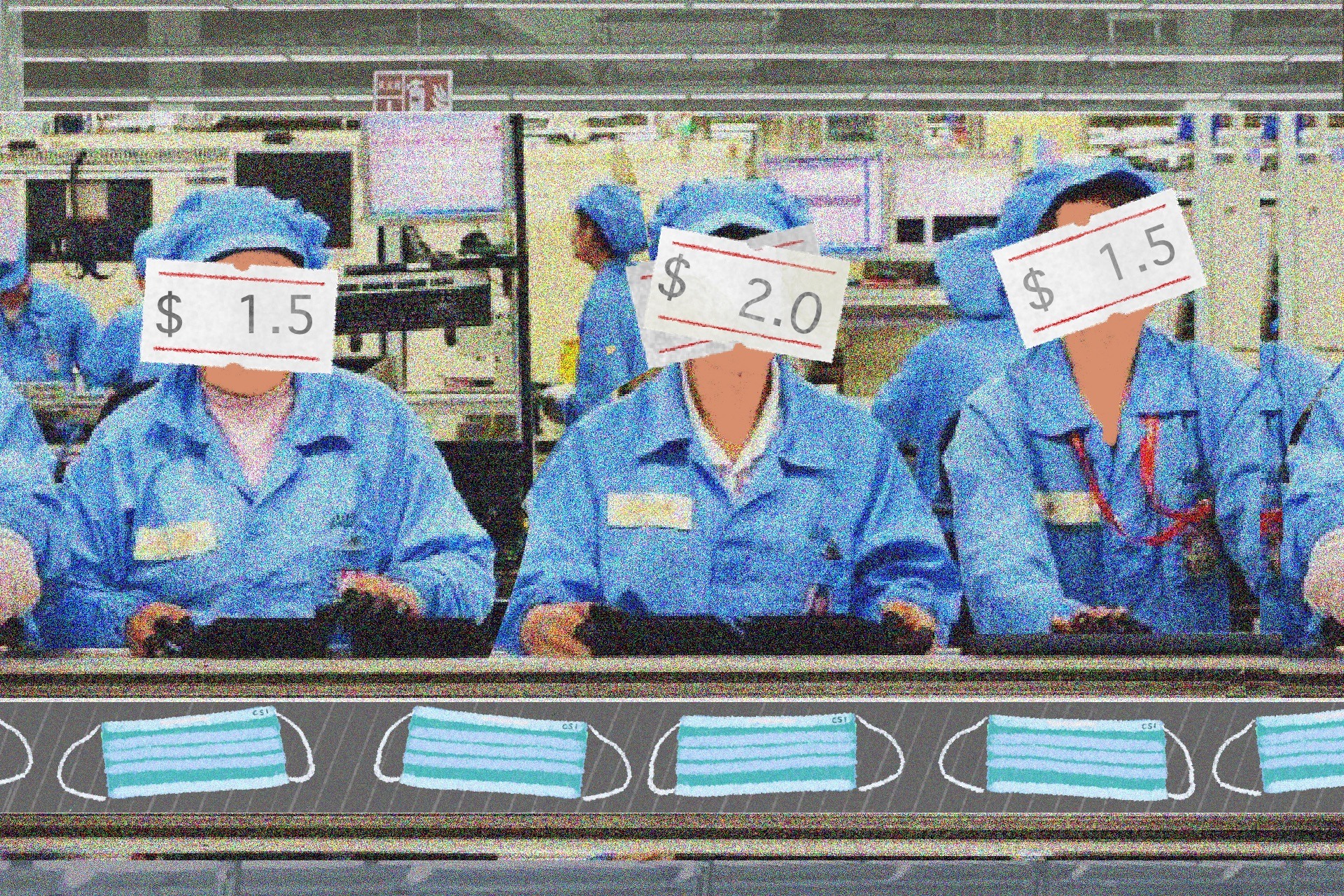Original: 【再有女囚友報料反駁懲教署】, published in Stand News
Translator: SR, P
If you would like to be involved in our translation work, please get in touch here.
Translator’s note: Below are translations of three short updates from late January to early February from the office of Shiu Ka-chun, a member of the Hong Kong Legislative Council in the Social Welfare functional constituency. Shiu publicized overlooked accounts of labor exploitation, wage theft and human rights violation in the midst of emergency facemask production from female inmates in Hong Kong’s carceral system.
1. Please do not berate inmates for the government’s incompetence.
Shiu Ka-chun’s statement on inmates’ overtime work in the expedited production of facemasks.
As the coronavirus outbreak continues to spiral out of control, the facemask shortage has only driven more Hongkongers to paranoia. Reports indicate that the Correctional Services Department (CSD) has planned to escalate facemask production from 110,000 per month to 180,000.
In times of crisis, everybody has a role to play. If incarcerated people need to work extra at night or in the early hours, Hongkongers must express their sincere gratitude accordingly. And yet, any decisions on overtime work must be based upon a foundation of mutual agreement. In order to show our thanks properly, I suggest that inmates be remunerated for their overtime work with overtime pay instead of with compensatory leave.
Overtime pay refers to all wages due in compensation toward extended working hours beyond a standard period of time. This pay is doubled because it is meant to signal that any labor done beyond the expected hours should be compensated with higher wages than usual.
Inmates are not in the wrong whether or not they are willing to work overtime to produce facemasks. They were never supposed to take on such a tremendous responsibility: this has always been the government’s job, and the only reason we have to scramble for even the most basic preventive measures is due to the government’s spectacular incompetence.
Please do not berate inmates for the failure of the administration or neglect their basic human rights. These are some brief points I hope to make on behalf of incarcerated people in the midst of pandemic.
Shiu Ka-chun via Facebook
31 January, 2020
2. Please pay attention to the human rights of those being forced to work overtime to produce surgical masks.
Our office has received a report from a female inmate concerning the rushed order for facemasks in the Industries Units under the CSD. The informant feels that the situation involves unjust conditions, and has asked our office to publicize the contents of her report in order to raise general awareness in addition to demanding humane treatment of inmates working overtime by the CSD. Details are as follows:
The facemask “production line” has officially begun to operate around the clock. Apart from mealtimes, production has been at full force; the informant told us that she has never encountered such a situation during her incarceration.
The informant said that daytime work is usually scheduled between 10am and 4:30pm. Excluding lunch and break time, inmates usually work about five hours per day. However, ever since the Industries Units announced 24/7 operations, inmates assigned to daytime labor have been required to work overtime for three more hours after dinner at 5pm; it is not until 8pm that they can finally rest for the day.
In order to fulfill the urgent order, facemask production has increased from one to two shifts with additional overnight shifts taken up by reshuffling existing manpower.
24/7 facemask production is an exploitative operation that deprives inmates of wages, time and health.
Overnight shifts are between 8pm and 6am the next morning. CSD staff would call for inmates in different production units to “move around” their shifts in order to pick up the pace of output. These reassignments would seem consensual on the surface, but the informant claimed that CSD staff would deliberately single out female inmates who would not dare to turn down such “voluntary” arrangements; when the staff “asks” you to participate, there is no room to say no.
Among those chosen to work the overnight shifts are women in their forties and fifties, most of whom worried that their bodies would not be able to withstand the burden of such an upended schedule. The more elderly women cannot help but experience symptoms of overwork like blurred vision and shaking hands as they work under the fear that they would not make the quota. However, CSD staff would ask them to keep going “for the moment”; only until more serious problems arise may they go back to their original production units. The inmates who don’t want to cause trouble but have unfortunately been chosen mostly do not dare tell the staff the truth about their physical state.
Inmates’ wages are mainly determined by the requisite level of complexity or rigour associated with different units of production; the highest monthly wage can reach HK$860. However, facemask production units––including three hours of overtime remuneration––only reach about HK$600 at the maximum. For those who have been reassigned to facemask production, this means a coercive reduction of wages. Despite overtime and overnight work, wages not only do not increase but in fact decrease; in other words, 24/7 facemask production is an exploitative operation that deprives inmates of wages, time and health.
Inmates are only given one facemask per day regardless of which production unit they work within. Unsurprisingly, disinfectants are also insufficiently supplied in the corrections facilities in general, which means that inmates are unable to reuse facemasks once they have taken them off without risking infection. Taking washrooms as an example, you can’t put the toilet seats down after flushing in both the production spaces and the cells. This directly contradicts the recommendation that toilet seats be closed following flushing to prevent splattering of germs everywhere as advocated by Dr. Ho Pak-leung, director of the Center of Infection at the University of Hong Kong. Moreover, even if inmates happen to sneeze or cough for any reason whatsoever, they have no choice but to reuse the same facemasks. While ideal, washing hands frequently is also generally impossible during incarceration; preventive infrastructure against disease is therefore extremely rudimentary.
I urge members of the public to turn their attention toward the basic human rights of inmates during the expedited production of facemasks. I also call for the CSD to take inmates’ needs seriously, be attentive toward their health, as well as recompense their labor properly. I reiterate that inmates should not have had to shoulder the incredible obligation of emergency facemask production in the first place; this is the Hong Kong government’s responsibility, and inmates should not become convenient scapegoats for the government’s inability to deliver.
Shiu Ka-chun
Legislative Council (Social Welfare Constituency) Member
4 February 2020
3. Another female inmate informant rebukes the Correctional Services Department.
The rights of people in prison should not be ignored; immediately address where masks from the Correctional Services Industries are going.
Our office has received another report from a female inmate informant at Lo Wu prison, rebutting the CSD claim that prisoners tasked with producing enough surgical masks to meet an urgent order can choose whether to work during night shifts. The female inmate said that the CSD’s reply was simply bureaucratic jargon; the situation inside the prison is nothing like it has claimed, and staff members specifically have targeted those inmates who do not speak out.
After I revealed the news that female inmates have been forced to meet rush orders for producing surgical facemasks on 4 February, the CSD Public Relations and External Affairs Section issued the following reply to Ming Pao: “In order to meet the Government Logistics Department’s request for production of greater quantities of surgical facemasks, the CSD has now operationalized a surgical mask factory, with three daily shifts. Every shift is accompanied with adequate resting time; prisoners can choose to participate in night shifts, and if they discover that they are not well-suited to them, they can raise the issue with management staff at any time, who will subsequently make the appropriate arrangements.”
A female inmate who had been given a quota of facemasks to produce was dissatisfied with the CSD’s claims, and has issued the following rebuke:
According to her, the inmates working the overnight shift to meet the expected number of masks had all been forced to do so. She explained that the highest monthly salary available for those producing the masks was HK$860, but that only one person could receive this salary. The other inmates generally receive only HK$300-$400 which, when broken down, amounts to HK$1.5-$2 (about US$0.2 to $0.25) an hour. What would motivate someone to take on an additional night shift for HKD$1.5 an hour? How could people not have been forced?
The female inmates chosen to undertake the work were all above 40 years old, and the oldest was more than 60 years old. The management staff typically did not choose younger inmates to take on additional shifts or to work overnight because they are usually more able to defend their rights. Staff members usually want to avoid the hassle of negotiation. On the other hand, management staff mainly chose older women who are usually quiet, afraid of causing offense, and would rather avoid confrontation, to undertake the work in the knowledge that they would rarely refuse.
After a long day’s work, the women would come back to their bunks and start crying.
Inmates who did not immediately agree to taking on additional shifts were asked by management staff to “sit to one side.” They were not allowed to eat meals at regular times with the other inmates; afterwards, they were requested to have one-to-one meetings with higher-level management staff and “reminded” that if they did not accept the additional or overnight shifts, they would face the consequences of having to engage in more arduous tasks, such as cleaning or working in the kitchen. Worse still, they might be accused of defying orders and punished through solitary confinement. For this reason, the older women had no choice but to acquiesce to their demands. The informant said that she saw older women exhausted and exploited as a result of such policies; after a long day’s work, the women would come back to their bunks and start crying.
Management staff also reserved “special treatment” for non-local inmates who do not speak Cantonese or English fluently. Non-local inmates who do not speak English fluently, such as those from Indonesia, Bangladesh, or the Philippines, or those who do not understand Putonghua but only their local dialect, and who come from rural areas in the Mainland, were frequently requested to work overtime. But the informant also said that African inmates who had similar language barriers were not asked by the management staff to take on additional shifts or to work overtime because the consulates of African countries apparently have an upper hand over those of Asian countries, and the staff members wanted to avoid receiving complaints.
One inmate who had requested medication for psychiatric issues was also chosen for the overnight shift. Because of side-effects of drowsiness for certain drugs, she decided to forgo her medication in the rush to get to work, to avoid being scolded and punished for moving too slowly. The medication is supposed to be a sedative, to enable those who take it to fall asleep; the combination of stopping medication and the lack of rest led her to feel especially exhausted during the overnight shift.
The informant added that, as she recalled, the first order of facemasks came on 5 January when the inmates were first informed of the additional shifts. In the beginning, only two hours were added to the daily work schedule; after a while, when the supply was clearly not meeting the demand, the prison started demanding that inmates work around the clock to produce the masks. From the beginning of February, they have started to work to fulfill an allocated quota, with more and more people joining the operation. As far as she knew, the expected production quota is 50,000 to 60,000 surgical masks a day.
The inmates themselves were quite concerned about where the masks they produce every day would go, but the management staff did not reveal that information, and so they were left without a clue. Local inmates in the prison said that if working overtime could help assuage Hongkongers’ anxiety in lining up for masks, they might be glad to contribute something to Hong Kong; however, as it currently stands, they are very suspicious of where the masks are going. The informant hopes that people would continue to scrutinize the situation and demand that the government disclose the whereabouts of the masks.
Shiu Ka-chun
Legislative Council (Social Welfare Constituency) Member
7 February 2020






